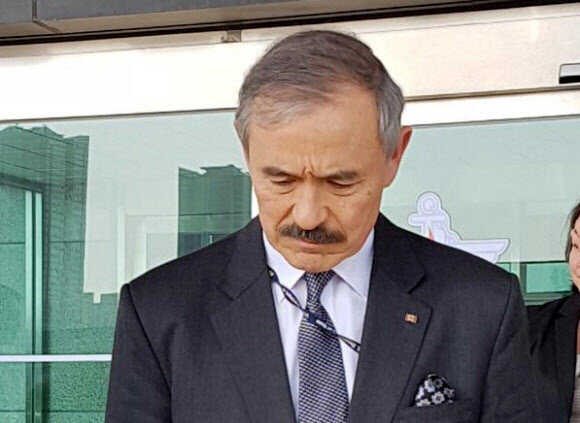hankyoreh
Links to other country sites 다른 나라 사이트 링크
S. Korea’s Foreign Ministry asks US to refrain from public comments about GSOMIA

South Korean Vice Foreign Minister Cho Se-young summoned US Ambassador to South Korea Harry Harris to the Ministry of Foreign Affairs and requested that the US government “refrain” from public remarks and expressions of displeasure in regard to Seoul’s decision to withdraw from its intelligence-sharing agreement with Japan.
South Korea’s Foreign Ministry was essentially calling for a stop to the US’ repeated expression of “deep disappointment” and “concerns” since Seoul’s decision to terminate the General Security of Military Information Agreement (GSOMIA) on Aug. 22. A US official has even taken issue with the South Korean military’s Dokdo defense exercise on Aug. 27.
On Aug. 28, the Foreign Ministry disclosed that it had summoned Harris to its building in the Doryeom neighborhood of Seoul’s Jongno District that morning. Sources said that Cho stressed during his meeting with Harris that the South Korean government had made its decision about GSOMIA in the context of South Korea-Japan relations and that there was no intention to negatively impact the South Korea-US relationship or alliance. But Cho added that repeated public messages of disappointment and concern by the US “don’t help strengthen our relationship or alliance.”
Cho explained that the US’ disappointment and concerns had been communicated to South Korea and asked the US to refrain from publicly conveying that message any more. “Restraint [on those remarks] helps strengthen the South Korean government’s resolve, and I’m concerned that the failure to do so could have the opposite effect,” Cho said.
The apparent reason that Cho summoned Harris to express this position is because the South Korean government concluded that the US doesn’t adequately understand its true intentions. The meeting was also designed to put a halt to the US government’s repeated expression of criticism about Seoul’s decision to terminate GSOMIA.
The US has continued to voice its irritation since the GSOMIA decision was made on Aug. 22. The US State Department said in a statement on Aug. 22 that the US was “deeply concerned and disappointed” about the Moon administration’s decision not to extend GSOMIA. Those sentiments were reiterated on Aug. 25 in a tweet by the department’s spokesperson, who said, “We are deeply disappointed and concerned that the ROK’s government terminated the General Security of Military Information Agreement.” The spokesperson’s comments were translated into Korean by the US Embassy in Seoul and retweeted on its official Twitter account.
While speaking to Harris, Cho also brought up remarks made on Aug. 27 by a US State Department spokesperson about the South Korean military’s Dokdo defense exercise. Cho reportedly said he wanted to “speak plainly about the US’ unusual adoption of a position on a regular, defensive exercise designed to protect our territory.” Sources said that Cho also asked for the US’ “understanding” since such remarks “don’t help strengthen South Korea-US relations.”
“Given the recent disagreements between the ROK and Japan, the timing, messaging, and increased scale of military drills at Liancourt Rocks [Dokdo] are not productive toward resolving ongoing issues,” Yonhap News quoted the spokesperson as saying.
While sources didn’t say how Harris responded to Cho’s remarks, the American government appears to be still asking South Korea to reconsider its GSOMIA decision.
By Noh Ji-won, staff reporter
Please direct comments or questions to [english@hani.co.kr]

Editorial・opinion
![[Column] Season 2 of special prosecutor probe may be coming to Korea soon [Column] Season 2 of special prosecutor probe may be coming to Korea soon](https://flexible.img.hani.co.kr/flexible/normal/500/300/imgdb/original/2024/0426/3317141030699447.jpg) [Column] Season 2 of special prosecutor probe may be coming to Korea soon
[Column] Season 2 of special prosecutor probe may be coming to Korea soon![[Column] Park Geun-hye déjà vu in Yoon Suk-yeol [Column] Park Geun-hye déjà vu in Yoon Suk-yeol](https://flexible.img.hani.co.kr/flexible/normal/500/300/imgdb/original/2024/0424/651713945113788.jpg) [Column] Park Geun-hye déjà vu in Yoon Suk-yeol
[Column] Park Geun-hye déjà vu in Yoon Suk-yeol- [Editorial] New weight of N. Korea’s nuclear threats makes dialogue all the more urgent
- [Guest essay] The real reason Korea’s new right wants to dub Rhee a founding father
- [Column] ‘Choson’: Is it time we start referring to N. Korea in its own terms?
- [Editorial] Japan’s rewriting of history with Korea has gone too far
- [Column] The president’s questionable capacity for dialogue
- [Column] Are chaebol firms just pizza pies for families to divvy up as they please?
- [Column] Has Korea, too, crossed the Rubicon on China?
- [Correspondent’s column] In Japan’s alliance with US, echoes of its past alliances with UK
Most viewed articles
- 1[Column] Season 2 of special prosecutor probe may be coming to Korea soon
- 2No good, very bad game for Korea puts it out of Olympics for first time since 1988
- 3‘We must say no’: Seoul defense chief on Korean, USFK involvement in hypothetical Taiwan crisis
- 4Korea’s 1.3% growth in Q1 signals ‘textbook’ return to growth, says government
- 5Division commander ordered troops to enter raging flood waters before Marine died, survivor says
- 6Is N. Korea threatening to test nukes in response to possible new US-led sanctions body?
- 7Is Japan about to snatch control of Line messenger from Korea’s Naver?
- 8[Editorial] In the year since the Sewol, our national community has drowned
- 9[Editorial] 10 years on, lessons of Sewol tragedy must never be forgotten
- 10[Editorial] New weight of N. Korea’s nuclear threats makes dialogue all the more urgent